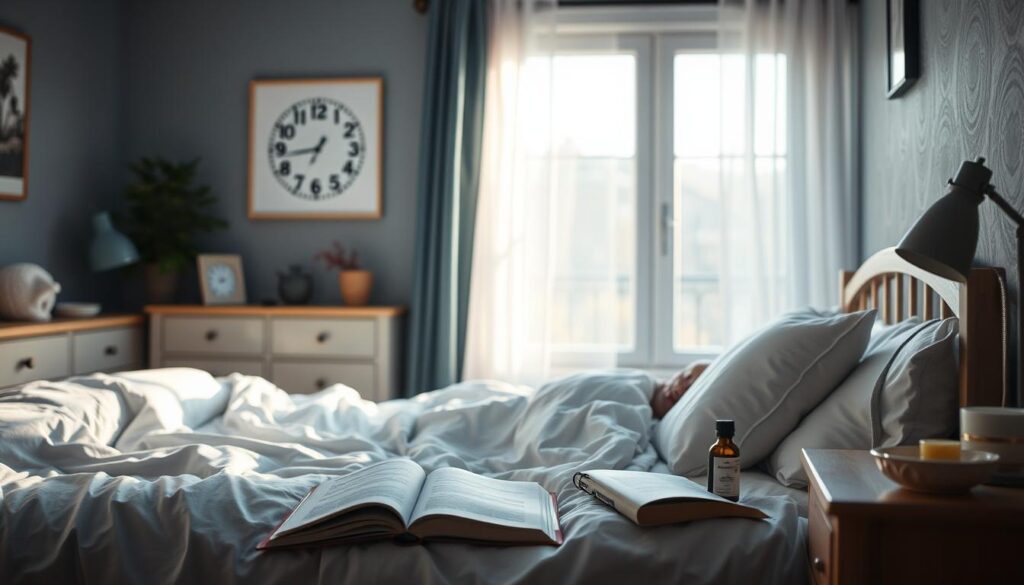Men in their 40s often see changes in sleep patterns. Hormonal shifts, more responsibilities, and age play a role. This article shares science-backed ways to boost sleep quality for men over 40. We’ll look at how to create a great sleep space, make lifestyle changes, and stick to a sleep schedule. These steps help ensure better rest and overall health.
Understanding Sleep Changes in Middle-Aged Men
Men in their 40s often see big changes in how they sleep. Hormonal shifts, like lower testosterone, can affect sleep quality. Work and family demands also raise stress levels, making sleep harder to get.
Hormonal Changes and Sleep Patterns
Lower testosterone in older men can disrupt sleep. Research shows sleep time drops by 8 minutes every decade. Slow-wave and REM sleep also decrease, leading to lighter, less restful sleep.
Impact of Work and Family Responsibilities
Middle-aged men juggle work and family, affecting their sleep. Work stress and family duties can cut into sleep time. They also wake up more often, making sleep less deep and restorative.
Age-Related Sleep Efficiency
As men get older, sleep quality worsens. Sleep efficiency, or the time spent actually sleeping, drops. This leads to more wake-ups and less deep sleep, raising health risks.

Knowing why sleep changes happen in middle-aged men helps. Making lifestyle changes, like exercise and a regular sleep schedule, can improve sleep. This can help avoid insomnia and enhance overall health.
Common Sleep Disruptors After 40
Men in their 40s and beyond often face sleep problems. Hormonal changes and stress are big factors. These can lead to insomnia and poor sleep.
Hormonal Changes and Sleep Patterns
Hormonal shifts, like lower testosterone, affect sleep. This can cause sleep disorders like sleep apnea. Sleep apnea is more common in postmenopausal women.
Work and Family Responsibilities
Work and family stress can disrupt sleep. Trying to balance work, home, and personal life can be tough. It makes it hard to relax and sleep well.
Age-Related Sleep Efficiency
As we get older, our sleep changes. Older adults sleep less deeply. Health issues like chronic pain also affect sleep.
Environmental and Lifestyle Factors
- Blue light from screens can stop melatonin production.
- Irregular sleep and bad habits, like caffeine before bed, harm sleep.
- Stress and big life changes make it hard to sleep well.
To fight these sleep issues, men over 40 should stick to a sleep routine. They should relax and keep their sleep area good. By tackling these problems, they can avoid insomnia and sleep better.
Creating the Perfect Sleep Environment
Getting better sleep starts with making your sleep space just right. This means controlling the temperature, lighting, and noise. Small changes can make a big difference in how well you sleep.
Bedroom Temperature and Lighting
Keep your bedroom cool, between 60 to 67 degrees Fahrenheit. This cool, comfortable environment helps you sleep better. Also, avoid bright lights in the evening. Blue light from screens can mess with your sleep cycle.
Noise Control and Sleep Tech
A quiet room is key for good sleep. Use white noise machines or earplugs to block out noise. And, keep electronic devices out of the bedroom to avoid distractions.
Mattress and Bedding Considerations
A good mattress and bedding are crucial. Choose a mattress that fits your sleep style and replace it every 7 to 10 years. Also, change your pillows often for better support and comfort.
Creating a sleep-friendly space is a big step towards better sleep and improved sleep hygiene. These tips can help you wake up feeling great and ready for the day.

Better Sleep Through Lifestyle Changes
Changing your lifestyle can greatly help men over 40 sleep better. Regular exercise, best done in the day, helps a lot. Try to sleep 7-9 hours each night.
Stay away from caffeine, alcohol, and big meals before bed. Stress can also hurt your sleep. Use meditation or deep breathing to relax.
Don’t look at screens with blue light before bed. Have a calming bedtime routine. If sleep issues keep bothering you, see a doctor. They can check for health problems or suggest therapy.
By making these changes, men over 40 can sleep better. This can also lower risks of heart disease, obesity, depression, and dementia. Focus on getting good sleep to improve your health.










